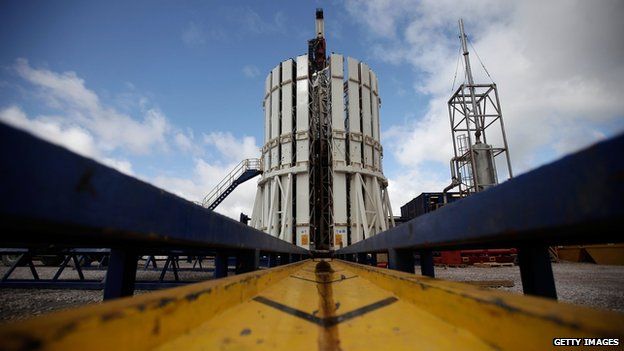Headline numbers: Is fracking viable at current prices?
- Published

Has the decision by Lancashire County Council on whether to allow Cuadrilla Resources to conduct exploratory fracking been overtaken by events, given that oil has fallen below $50 a barrel?
On Wednesday, the council agreed to a two-month delay to the decision after Cuadrilla submitted additional information.
In June, when the company put in the original application for the two sites between Blackpool and Preston, oil was above $110 a barrel and it has been falling ever since.
It's important to stress that Cuadrilla is looking for shale gas, not oil, but the wholesale price of natural gas tends to follow the same trends as oil.
John Hall from Alfa Energy Group says: "The shale gas market took off in the US on the back of rising oil prices" as the price rose from around $60 a barrel in 2007 and started heading towards $140.
"My guess is that with the Brent price below $50 it will be difficult to justify short-term investment in shale, certainly in the UK," he says.
The likes of Chevron, Shell and Exxon have been delaying expansion plans or shelving projects worldwide that no longer look profitable.
So what is the break-even price for onshore shale gas in the UK? As with so many figures relating to the oil and gas industry, it is very hard to tell.
Cuadrilla wants to conduct exploratory drilling because it does not know how much shale gas there is in the area or how easy it would be to extract.
Greenpeace assembled some research and concluded that: "gas prices need to be higher than they are, or what the market says they will be, for the UK shale gas sector to even break even".
But Cuadrilla is playing a longer game than that. First of all, even if it gets regulatory clearance in two months, it is unlikely to be commercially extracting any gas from the ground until the end of the decade, by which time prices could have changed considerably.
Also, it is not just the suitability of the rocks for fracking that is being tested at the moment - it is the whole planning process.
Prof Stuart Haszeldine from the University of Edinburgh says it is unlikely that the first projects in the UK would be profitable anyway, "because of the intense legislative burden, and because they are one-offs with large mobilisation costs to get the rig and crew on site".
Potential frackers would hope that if these projects get the go-ahead, future projects would take less time to get approval, and equipment and experienced staff would become easier and cheaper to find.
On top of that, Cuadrilla chief executive Francis Egan told the Telegraph recently that lower oil and gas prices are actually quite good news for him at the moment, because they reduce the price of services and raw materials.
"Contractors earning 20% less in Aberdeen in January than December - that feeds straight through to the prices services companies offer us for drilling and fracturing," he said.
A lower oil price makes it harder to get funding for exploration, but Mr Egan also pointed out that Cuadrilla's funding for the exploratory boreholes was already covered by a £160m deal with Centrica in 2013.
So it seems that today's price is not entirely relevant to the sort of long-term project Cuadrilla is involved in, as long as it can maintain the funding to keep the planning and exploration going.
The real concern for the companies would be if the delays to the process mean that the money runs out before the exploration is finished.